-
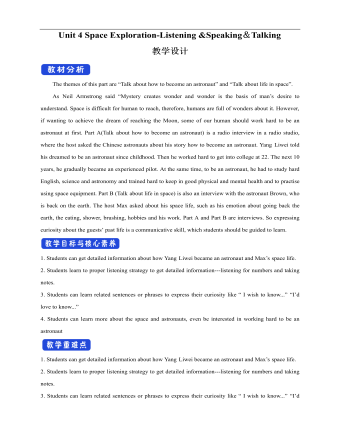
新人教版高中英语必修3Unit 4 Space Exploration-Listening&Speaking&Talking教学设计二
The themes of this part are “Talk about how to become an astronaut” and “Talk about life in space”. As Neil Armstrong said “Mystery creates wonder and wonder is the basis of man’s desire to understand. Space is difficult for human to reach, therefore, humans are full of wonders about it. However, if wanting to achieve the dream of reaching the Moon, some of our human should work hard to be an astronaut at first. Part A(Talk about how to become an astronaut) is a radio interview in a radio studio, where the host asked the Chinese astronauts about his story how to become an astronaut. Yang Liwei told his dreamed to be an astronaut since childhood. Then he worked hard to get into college at 22. The next 10 years, he gradually became an experienced pilot. At the same time, to be an astronaut, he had to study hard English, science and astronomy and trained hard to keep in good physical and mental health and to practise using space equipment. Part B (Talk about life in space) is also an interview with the astronaut Brown, who is back on the earth. The host Max asked about his space life, such as his emotion about going back the earth, the eating, shower, brushing, hobbies and his work. Part A and Part B are interviews. So expressing curiosity about the guests’ past life is a communicative skill, which students should be guided to learn.1. Students can get detailed information about how Yang Liwei became an astronaut and Max’s space life.2. Students learn to proper listening strategy to get detailed information---listening for numbers and taking notes.3. Students can learn related sentences or phrases to express their curiosity like “ I wish to know...” “I’d love to know...”4. Students can learn more about the space and astronauts, even be interested in working hard to be an astronaut
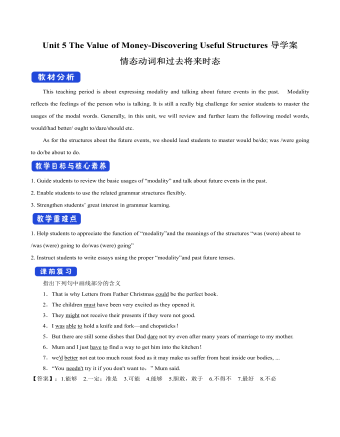
新人教版高中英语必修3Unit 5 The Value of Money-Discovering Useful Structures导学案
4.They were going to find someone to take part in their bet when they saw Henry walking on the street outside.[归纳]1.过去将来时的基本构成和用法过去将来时由“would+动词原形”构成,主要表示从过去某一时间来看将要发生的动作(尤其用于宾语从句中),还可以表示过去的动作习惯或倾向。Jeff knew he would be tired the next day.He promised that he would not open the letter until 2 o'clock.She said that she wouldn't do that again.2.表示过去将来时的其他表达法(1)was/were going to+动词原形:该结构有两个主要用法,一是表示过去的打算,二是表示在过去看来有迹象表明将要发生某事。I thought it was going to rain.(2)was/were to+动词原形:主要表示过去按计划或安排要做的事情。She said she was to get married next month.(3)was/were about to+动词原形:表示在过去看来即将要发生的动作,由于本身已含有“即将”的意味,所以不再与表示具体的将来时间状语连用。I was about to go to bed when the phone rang.(4)was/were+现在分词:表示在过去看来即将发生的动作,通常可用于该结构中的动词是come,go,leave,arrive,begin,start,stop,close,open,die,join,borrow,buy等瞬间动词。Jack said he was leaving tomorrow.
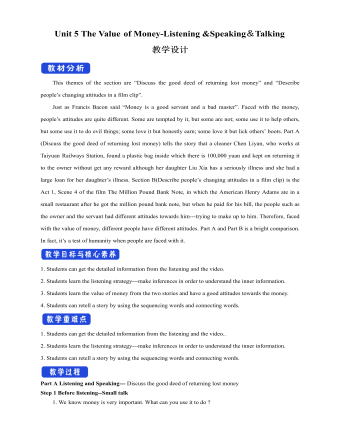
新人教版高中英语必修3Unit 5 The Value of Money-Listening &Speaking&Talking教学设计
4. A:We’d like to have someone to say a word at the beginning to welcome the group.B:↙Who?A:We thought that you or Dr.Johnson might do it.B用降调说Who,其意思是问,对方想让谁在开场时致欢迎词。Step 6 Pronunciation---Practice1. Listen to the short conversation and mark the intonation with ↗, ↙ or ↙, ↗. Then discuss with a partner what they intend to convey by using different intonation.Owner: You know what ?↗ It’s a million-pound bank note↙.Waiter 1: Really ?↗(question)Waiter 2: Really !↙(unbelievable and surprised)Waiter 3: Really ?!↙↗(first question then surprised)2. Listen to the conversations. Underline the parts that are stressed and mark the intonation. Then talk about the implied meanings of the responses with different intonations. Listen again and repeat.1) Henry: It’s a nice suit.Owner: Oh, it’s perfect!↙(The intonation means it is very suitable for Henry.)2) Henry: Well, that’s very kind of you.Owner: Kind, sir ?↗(what you said is not right) No, it’s kind of you. You must come whenever you want and have whatever you like. Just having you sit here is a great honour !!↙(welcome you to come again)3)Henry:Well, to be honest, I have none. Oliver:(happily) What luck!(excited) Brother↗, what luck!↙(It means “Didn’t you hear it?”)Henry: Well, it may seem lucky to you but not to me!↗(angry) If this is your idea of some kind of joke, I don’t think it’s very funny. Now if you’ll excuse me, I ought to be on my way.↙(If so, I would leave.)Roderick: Please don’t go↙...(hope Henry can wait for a moment)Part B Viewing and Talking---Describe people’s changing attitudes in a film clipStep 1 Before-listening---Tell the filmYou are going to watch part of the film The Million Pound Bank Note. Look at these photos and guess what happens in the film.
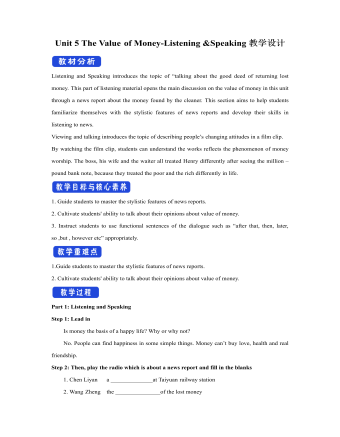
新人教版高中英语必修3Unit 5 The Value of Money-Listening &Speaking教学设计
Step 4: Listen again and decide if the following statements are true (T) or false (F).1 It was the first time Chen Liyan's story was reported. T口 F口2 Chen found 10,000 yuan in a small plastic bag in Taiyuan railway station口 F口3 Wang Zheng apologized to Chen because he couldn't offer her more money. T口 F口4 Chen took out a large loan to cure her daughter, T口 F口5 Wang set up a fundraising website for Chen's daughter after Chen told him about her situation. T口 F口Step 5:After listening, discuss the questions.1 What kind of person do you think Chen Liyan is?Chen Liyan is generous and honest because she returned a large sum of money to the owner.2 Did Chen return the money because she didn't need it?No. She returned the money because it was the right thing to do. Evidence for this is that she refused to accept the reward money because she felt that it had not been earned. 3 Is it common for people to do what Chen did?It depends on the culture. In some countries it is quite common to return money that has been found. In other countries, people believe "Finders are keepers!" 4 How did Wang Zheng feel about the return of his money?He must have been very happy and relieved to have gotten his money back. We know this because he thanked Chen repeatedly and even offered her a reward.5 Why did Ma Dongbao tell Wang about Chen's family?He must have had great sympathy for Chen and her daughter and wanted to help them.'We know this because he arranged help for them. 6 How did the news reporter feel about Chen's actions?The news reporter felt that it showed that money wasn't the most important thing in life. We know this because the reporter told us that this is what Chen believes. and then said, “that's a great attitude to take."
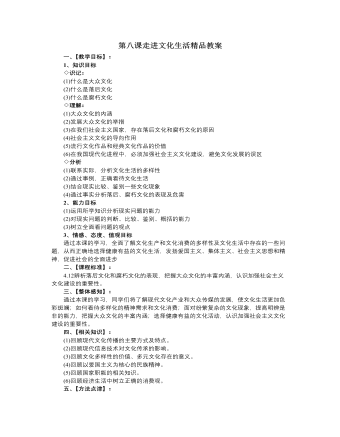
人教版高中政治必修3第八课走进文化生活精品教案
1.加强社会主义文化建设的必要性在人类历史的长河中,各种思想文化总是相互冲击、交汇、融合.奔腾向前,永不停息。今天,我们面对的文化有传统的和现代的、外来的和本土的、进步的和落后的、先进的和腐朽的、积极的和颓废的,等等。各种各样的文化有吸纳又有排斥,有融合又有斗争,有渗透又有抵御,呈现出前所未有的相互交织、相互激荡之势。在这种文化发展的大背景下,在我国现代化建设过程中,有必要弘扬我国社会主义的主流文化,这样有利于保证我国社会主义文化发展的方向。2.大力加强社会主义文化建设(1)中国特色社会主义文化在我国文化生活中处于主导地位。中国特色社会主义文化,始终坚持以科学的理论武装人,以正确的舆论引导人,以高尚的精神塑造人,以优秀的作品鼓舞人,无论是思想内容还是表现形式,都发挥着强有力的导向和示范作用。社会主义文化以其自身的科学性和先进性,并依靠社会主义政治和经济力量,在人民大众的文化生活中始终占据着主导地位。
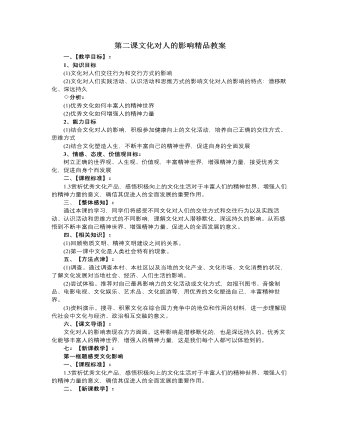
人教版高中政治必修3第二课文化对人的影响精品教案
民族精神是一个民族赖以生存和发展的精神支撑。一个民族,没有振奋的精神和高尚的品格,不可能自立于世界民族之林。“铁人”精神是“爱国、创业、求实、奉献”的大庆精神的典型化、人格化。其主要方面包括:“为祖国分忧、为民族争气”的爱国主义精神;为“早日把中国石油落后的帽子甩到太平洋里去”,“宁肯少活二十年,拼命也要拿下大油田”的忘我拼搏精神;干事业“有条件要上,没有条件创造条件也要上”的艰苦奋斗精神;“要为油田负责一辈子”,“干工作要经得起子孙万代检查”,对工作精益求精,为革命“练一身硬功夫、真本事”的科学求实精神;不计名利,不计报酬,埋头苦干的“老黄牛”精神;等等。40多年来,“铁人”精神早已家喻户晓,深入人心,成为大庆人的共同理想、信念和行为准则。“铁人”精神是对王进喜崇高思想、优秀品德的高度概括,体现了我国工人阶级精神风貌和中华民族传统美德的完美结合。“铁人”精神是战胜困难、勇往直前、不断取得新胜利的巨大精神力量。“铁人”精神是我们强大的精神支柱。
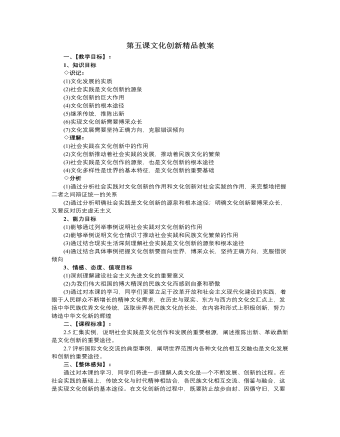
人教版高中政治必修3第五课文化创新精品教案
3.社会实践对文化创新的决定作用社会实践对文化创新具有两个方面的重要作用:(1)社会实践是文化创新的源泉实践,作为人们改造客观世界的活动,是一种有目的、有意识的社会性活动。人类在改造自然和社会的实践中,创造出自己特有的文化。离开了社会实践;文化就会成为无源之水、无本之木,人们不可能从事任何有价值的文化创造。◇本课小结:1.关于本课逻辑结构的宏观把握:文化创新的源泉和作用这一问题,教材分三个层次展开论证:一是不尽的源泉,不竭的动力;二是巨大的作用,深刻的意义;三是呼唤文化创新的时代。教材运用辩证方法从文化创新的源泉和作用展开论述。即社会实践是文化创新的源泉,文化创新又推动社会实践的发展和促进民族文化的繁荣。教材关于文化创新的途径问题,从三个层次展开讲述:第一个层次是“继承传统,推陈出新”;第二个层次是“面向世界,博采众长”;第三个层次是“坚持正确方向,克服错误倾向”。
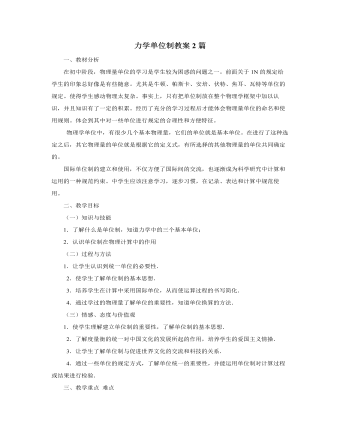
人教版新课标高中物理必修1力学单位制教案2篇
一、教材分析在初中阶段,物理量单位的学习是学生较为困惑的问题之一。前面关于1N的规定给学生的印象总好像是有些随意。尤其是牛顿、帕斯卡、安培、伏特、焦耳、瓦特等单位的规定。使得学生感动物理太复杂。事实上,只有把单位制放在整个物理学框架中加以认识,并且知识有了一定的积累。经历了充分的学习过程后才能体会物理量单位的命名和使用规则。体会到其中对一些单位进行规定的合理性和方便特征。物理学单位中,有很少几个基本物理量,它们的单位就是基本单位。在进行了这种选定之后,其它物理量的单位就是根据它的定义式,有所选择的其他物理量的单位共同确定的。国际单位制的建立和使用,不仅方便了国际间的交流,也逐渐成为科学研究中计算和运用的一种规范约束。中学生应该注意学习,逐步习惯,在记录、表达和计算中规范使用。二、教学目标(一)知识与技能1.了解什么是单位制,知道力学中的三个基本单位;2.认识单位制在物理计算中的作用
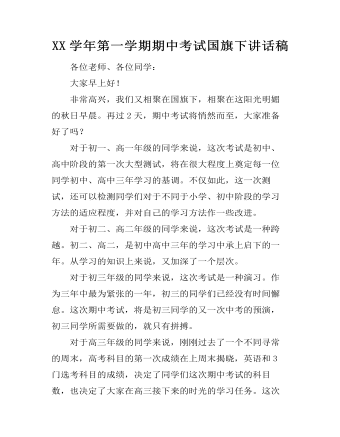
XX学年第一学期期中考试国旗下讲话稿
各位老师、各位同学:大家早上好!非常高兴,我们又相聚在国旗下,相聚在这阳光明媚的秋日早晨。再过2天,期中考试将悄然而至,大家准备好了吗?对于初一、高一年级的同学来说,这次考试是初中、高中阶段的第一次大型测试,将在很大程度上奠定每一位同学初中、高中三年学习的基调。不仅如此,这一次测试,还可以检测同学们对于不同于小学、初中阶段的学习方法的适应程度,并对自己的学习方法作一些改进。对于初二、高二年级的同学来说,这次考试是一种跨越。初二、高二,是初中高中三年的学习中承上启下的一年。从学习的知识上来说,又加深了一个层次。对于初三年级的同学来说,这次考试是一种演习。作为三年中最为紧张的一年,初三的同学们已经没有时间懈怠。这次期中考试,将是初三同学的又一次中考的预演,初三同学所需要做的,就只有拼搏。
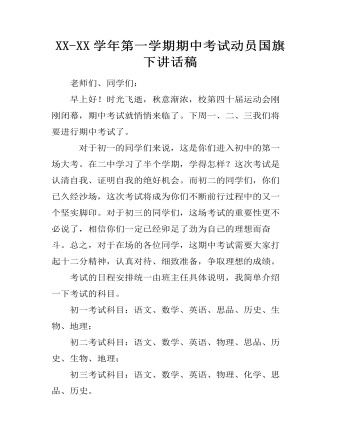
XX-XX学年第一学期期中考试动员国旗下讲话稿
老师们、同学们:早上好!时光飞逝,秋意渐浓,校第四十届运动会刚刚闭幕,期中考试就悄悄来临了。下周一、二、三我们将要进行期中考试了。对于初一的同学们来说,这是你们进入初中的第一场大考。在二中学习了半个学期,学得怎样?这次考试是认清自我、证明自我的绝好机会。而初二的同学们,你们已久经沙场,这次考试将成为你们不断前行过程中的又一个坚实脚印。对于初三的同学们,这场考试的重要性更不必说了,相信你们一定已经卯足了劲为自己的理想而奋斗。总之,对于在场的各位同学,这期中考试需要大家打起十二分精神,认真对待、细致准备,争取理想的成绩。考试的日程安排统一由班主任具体说明,我简单介绍一下考试的科目。初一考试科目:语文、数学、英语、思品、历史、生物、地理;初二考试科目:语文、数学、英语、物理、思品、历史、生物、地理;初三考试科目:语文、数学、英语、物理、化学、思品、历史。
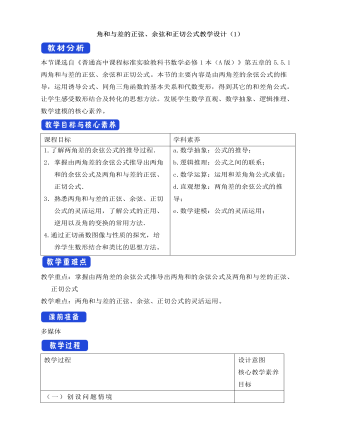
人教A版高中数学必修一两角和与差的正弦、余弦和正切公式教学设计(1)
本节课选自《普通高中课程标准实验教科书数学必修1本(A版)》第五章的5.5.1 两角和与差的正弦、余弦和正切公式。本节的主要内容是由两角差的余弦公式的推导,运用诱导公式、同角三角函数的基本关系和代数变形,得到其它的和差角公式。让学生感受数形结合及转化的思想方法。发展学生数学直观、数学抽象、逻辑推理、数学建模的核心素养。课程目标 学科素养1.了解两角差的余弦公式的推导过程.2.掌握由两角差的余弦公式推导出两角和的余弦公式及两角和与差的正弦、正切公式.3.熟悉两角和与差的正弦、余弦、正切公式的灵活运用,了解公式的正用、逆用以及角的变换的常用方法.4.通过正切函数图像与性质的探究,培养学生数形结合和类比的思想方法。 a.数学抽象:公式的推导;b.逻辑推理:公式之间的联系;c.数学运算:运用和差角角公式求值;d.直观想象:两角差的余弦公式的推导;e.数学建模:公式的灵活运用;
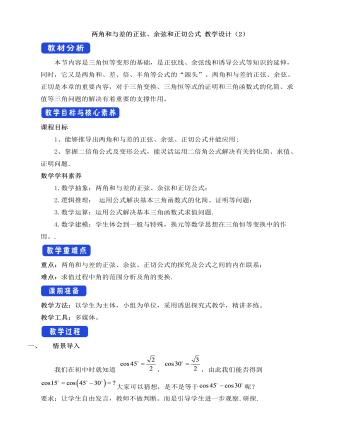
人教A版高中数学必修一两角和与差的正弦、余弦和正切公式教学设计(2)
本节内容是三角恒等变形的基础,是正弦线、余弦线和诱导公式等知识的延伸,同时,它又是两角和、差、倍、半角等公式的“源头”。两角和与差的正弦、余弦、正切是本章的重要内容,对于三角变换、三角恒等式的证明和三角函数式的化简、求值等三角问题的解决有着重要的支撑作用。 课程目标1、能够推导出两角和与差的正弦、余弦、正切公式并能应用; 2、掌握二倍角公式及变形公式,能灵活运用二倍角公式解决有关的化简、求值、证明问题.数学学科素养1.数学抽象:两角和与差的正弦、余弦和正切公式; 2.逻辑推理: 运用公式解决基本三角函数式的化简、证明等问题;3.数学运算:运用公式解决基本三角函数式求值问题.4.数学建模:学生体会到一般与特殊,换元等数学思想在三角恒等变换中的作用。.
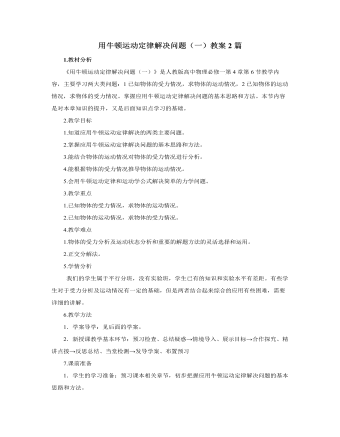
人教版新课标高中物理必修1用牛顿运动定律解决问题(一)教案2篇
(四)实例探究☆力和运动的关系1、一个物体放在光滑水平面上,初速为零,先对物体施加一向东的恒力F,历时1秒,随即把此力改变为向西,大小不变,历时1秒钟,接着又把此力改为向东,大小不变,历时1秒钟,如此反复只改变力的方向,共历时1分钟,在此1分钟内A.物体时而向东运动,时而向西运动,在1分钟末静止于初始位置之东B.物体时而向东运动,时而向西运动,在1分钟末静止于初始位置C.物体时而向东运动,时而向西运动,在1分钟末继续向东运动D.物体一直向东运动,从不向西运动,在1分钟末静止于初始位置之东☆牛顿运动定律的应用2、用30N的水平外力F,拉一静止放在光滑的水平面上质量为20kg的物体,力F作用3秒后消失,则第5秒末物体的速度和加速度分别是A.v=7.5m/s,a=l.5m/s2B.v=4.5m/s,a=l.5m/s2C.v=4.5m/s,a=0D.v=7.5m/s,a=0
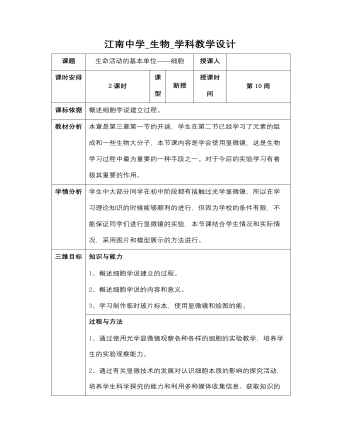
高中生物苏教版必修一《31生命活动及本单位-细胞》教案
本章是第三章第一节的开端,学生在第二节已经学习了元素的组成和一些生物大分子,本节课内容是学会使用显微镜,这是生物学习过程中最为重要的一种手段之一。对于今后的实验学习有着极其重要的作用。 学生中大部分同学在初中阶段都有接触过光学显微镜,所以在学习理论知识的时候能够顺利的进行,但因为学校的条件有限,不能保证同学们进行显微镜的实验,本节课结合学生情况和实际情况,采用图片和模型展示的方法进行。 知识与能力 1、概述细胞学说建立的过程。 2、概述细胞学说的内容和意义。 3、学习制作临时玻片标本,使用显微镜和绘图的能。
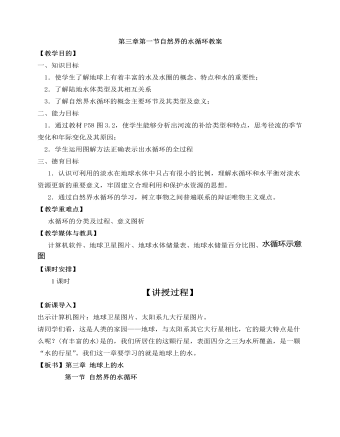
人教版高中地理必修1第三章第一节自然界的水循环教案
浅层地下水是贮存于地表松散堆积物中的潜水。主要受降水、气温、蒸发等气象因素影响,有明显的季节变化与日变化,并与河水有相应补给关系,即河水高于潜水面时,河水补给地下水,反之地下水补给河流;深层地下水是长时间内渗入地下深入储存起来的,它缓慢地流出补给河流,受气象因素影响很小,通常只有年变化,季节变化已不明显。当然,一条河流的河水补给来源往往不是单一的,而是以某一种形式为主的混合补给形式,对流域自然条件复杂的大的河流来说尤其如此。我国长江上游地区除雨水、地下水外,高原高山上冰川、积雪在夏季融化也补给河流;东北地区的河流,由春季融化积雪补给,夏季则由雨水和地下水补给;西北内陆盆地除雨水外,夏季高山冰川、积雪融化成为河流的主要补给形式。我国季风地区,大部分河流以雨水补给为主,而冬季则由地下水补给。
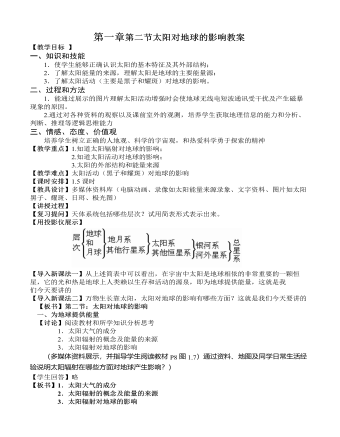
人教版高中地理必修1第一章第二节太阳对地球的影响教案
一、知识和技能1.使学生能够正确认识太阳的基本特征及其外部结构;2.了解太阳能量的来源,理解太阳是地球的主要能量源;3.了解太阳活动(主要是黑子和耀斑)对地球的影响。二、过程和方法1.能通过展示的图片理解太阳活动增强时会使地球无线电短波通讯受干扰及产生磁暴现象的原因。2.通过对各种资料的观察以及课前室外的观测,培养学生获取地理信息的能力和分析、判断、推理等逻辑思维能力三、情感、态度、价值观培养学生树立正确的人地观、科学的宇宙观,和热爱科学勇于探索的精神【教学重点】1.知道太阳辐射对地球的影响; 2.知道太阳活动对地球的影响;3.太阳的外部结构和能量来源【教学难点】太阳活动(黑子和耀斑)对地球的影响
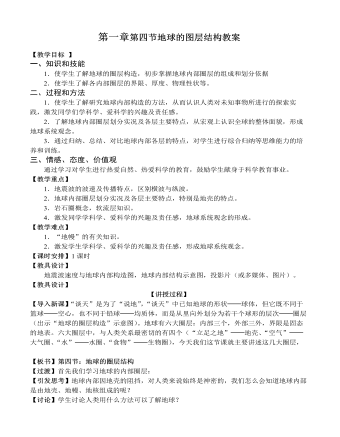
人教版高中地理必修1第一章第四节地球的图层结构教案
一、知识和技能1.使学生了解地球的圈层构造,初步掌握地球内部圈层的组成和划分依据2.使学生了解各内部圈层的界限、厚度、物理性状等。二、过程和方法1.使学生了解研究地球内部构造的方法,从而认识人类对未知事物所进行的探索实践,激发同学们学科学、爱科学的兴趣及责任感。2.了解地球内部圈层划分实况及各层主要特点,从宏观上认识全球的整体面貌,形成地球系统观念。3.通过归纳、总结、对比地球内部各层的特点,对学生进行综合归纳等思维能力的培养和训练。三、情感、态度、价值观通过学习对学生进行热爱自然、热爱科学的教育,鼓励学生献身于科学教育事业。【教学重点】1.地震波的波速及传播特点,区别横波与纵波。2.地球内部圈层划分实况及各层主要特点,特别是地壳的特点。3.岩石圈概念,软流层知识。
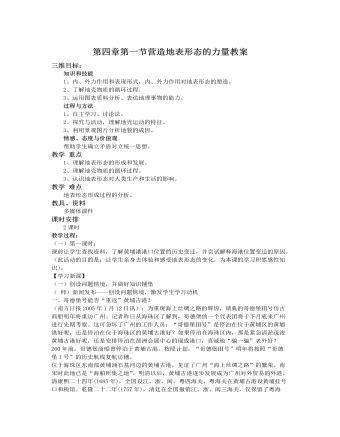
人教版高中地理必修1第四章第一节营造地表形态的力量教案
晶晶和亮亮是两滴岩浆,他们生活在地球内部的:岩浆之家。一天,他们得到批准,与其他同伴一起到地球表面进行旅行。他们飞快地奔向地表,半路上,晶晶觉得累了,于是就与亮亮约好,在地表汇合。亮亮没有停步,与其他伙伴一起跳出地表,并沿着山坡往低处流动。忽然,亮亮发现自己不能再动了,不禁问旁边的同伴这是怎么一回事。同伴笑着说:“别担心,只不过你已经不再是岩浆罢了。”问题1、为什么同伴说亮亮已经不再是一滴岩浆了?2、你认为亮亮还可以继续他的地表旅行吗?请说明原因。(由学生讨论回答。)过了好长的一段时间,亮亮发现自己的个头变小了,并随着风和流水往前运动了。亮亮边走边欣赏着地表美丽的风光。忽然,亮亮发现一个熟悉的身影,认真一看,原来是晶晶。亮亮惊讶地问:“你是怎么来到地表的?”3、请你简要推测晶晶到达地表的过程。(由学生讨论回答。)亮亮和晶晶又一起踏上旅程。
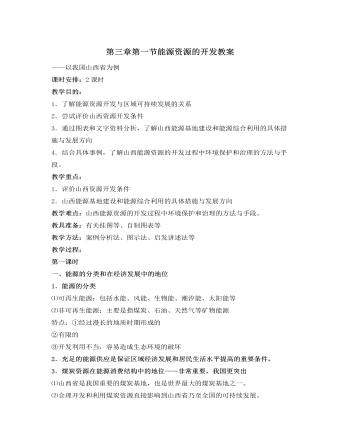
人教版高中地理必修3第三章第一节能源资源的开发教案
山西省总结出了许多重点工矿区的生态环境建设模式,即围绕煤田的露天开采区、居民点和主要交通线建设区,通过工程及生物措施,结合土地的复垦,充分利用厂矿的人力、财力和科技优势,建立集约经营的高效蔬菜、水果及肉蛋奶生产基地(图3.13)。1.说一说图中各种工程及生物措施的作用。点拨:参考图3.13图中各工程及措施的作用:(1)隔离护坝:主要作用是将采掘区与河流隔开,以免河水流入采掘区。(2)排水沟:主要作用是引开可能进入采掘区的雨水或其他水源。(3)公路紧靠采掘区,方便运输车辆就近从工地上公路。(4)“固沙草方格”,即在流沙表面用麦草、稻草扎成1×1米的草方格,使流沙不易被风 吹起,达到阻沙、固沙的目的,并在草方格上栽种沙蒿、花棒、籽蒿、拧条等沙生植物,建立起旱生植物带,营造挡沙树林。
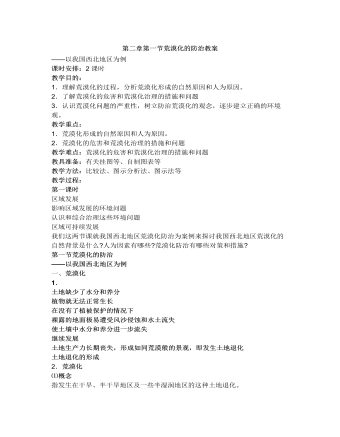
人教版高中地理必修3第二章第一节荒漠化的防治教案
1.根据下面的图文资料,说明前苏联垦荒区土壤风蚀的潜在自然背景。并说明人们的生产活动怎样加剧了这个过程。点拨:对图2.16的分析,要知道”垦荒地区”处于亚欧大 陆的中部偏北的地方,虽处于西风带但远离水汽来源,故降水稀少。从其周边的内陆湖“里海”、“咸海”的分布特点,可以推断,这是一个半荒漠向干草原的过渡地带,是一个生态环境比较脆弱的地区,其自然地理状况必定是寒冷、干旱、大风。2.20世纪60年代中期以来,前苏联在总结大规模垦荒经验教训的基础上,采取了一系列综合防护措施。仔细分析这些措施,你认为该地区防治荒漠化(土壤风蚀)的主要方向是什么?点拨:要善于将所列四项保护措施逐条进行分析,而后进行归纳,不难找出它们之间的共同的东西,那就是“抗旱、防风、保水、保土、保肥”。3.根据所学知识,你认为前苏联垦荒区防治荒漠化的对策与措施可以被我国的哪些地区所借鉴。





















